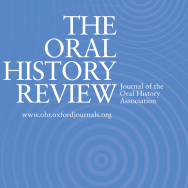The Oral History Review, the official journal of the Oral History Association, is accepting applications for an open position on the editorial team, the Copy- and Production Editor.
The successful applicant will join the five-member editorial team of the Review and will participate actively in the development of the journal. The editorial team—a creative and dedicated band of editors/oral historians—is committed to the journal and its place in the life of the Oral History Association and the broader oral history community. Together, we seek to make the Review a lively site in which to experience, discuss, and debate oral history.
This position is a wonderful opportunity for national visibility and service to a well-established scholarly journal. It provides a chance to network with well-known and emerging scholars in the field and to stay abreast of the latest oral history scholarship.
Applicants must, first and foremost, have experience as a copy-editor; an understanding of and/or familiarity with journal production would also be an asset. The OHR publishes roughly 500 pages worth of content annually, with our busiest times in December/January and June/July, but material streams in continuously throughout the year. This position provides a modest stipend to support this work. More details about the position can be found after the end of this announcement.
Candidates should also possess:
- solid organizational abilities to manage the volume of articles and reviews;
- interpersonal skills to work with authors from many backgrounds and fields;
- technological flexibility in order to learn and use both computer software applications (such as Word and Excel) and emerging web-based applications.
Deadline for applications is 1 January 2019. We will conduct interviews in mid to late January, with an expectation that the new editor will be selected no later than 1 February 2019, which will be the official start date for the position. Copy for the following issue of the journal will be due in June 2019.
To apply, please provide the following:
- Letter of application, stating interest in the position and describing relevant experience.
- C.V. or resume.
- Optional, but recommended: a short editing sample, roughly 1,000 to 1,500 words in length.
To submit an application or for more information about the editorial board, please contact:
David Caruso
Editor, Oral History Review
Director, Center for Oral History
The Science History Institute
315 Chestnut Street
Philadelphia, PA 19106
(215) 873-8236
dcaruso@sciencehistory.org
COPY- AND PRODUCTION EDITOR
The copy- and production editor of the Oral History Review is responsible for ensuring that all of the content for the Review meets the highest editorial standards in matters of technical style (punctuation, capitalization, references, quotations, and such), spelling and grammar, clarity, and readability, prepares journal content documents in final form for the press’s production, and works closely with the managing editor and representatives of the press to convey content to the press through various electronic means. This requires thorough knowledge of the journal’s designated style guides and references (the latest edition of the Chicago Manual of Style, the Merriam-Webster Collegiate and Unabridged dictionaries, and the OHR/Oxford University Press internal style guide), standard word-processing and data management software (principally Microsoft Word and Excel and Adobe Acrobat), and the tools of scholarly research.
Specific duties
- Read and correct all work published in the journal, applying all of the applicable rules and improvising where necessary (when, for example, no unambiguous rule applies) to ensure that authors’ intentions are conveyed clearly through appropriate choices of word and format and that citations and other references are correct.
- Correspond with authors with clarity and tact to effect necessary corrections, and work within stringent deadlines, carefully managing document workflow and version control.
- Work actively with other members of the editorial team to shepherd all content through the editing process.
- Establish—and revise as necessary—editorial policy, update the OHR style guide, and coordinate editorial processes with the press as necessary.
Coordinate the review and correction of first and final proofs the press submits to ensure that all journal content is free of errors, correctly and attractively formatted, and returned to the press for online and print access as deadlines require.

